
Today is the Solemnity of St. Joseph, the foster father of the Christ. He is sometimes called the Silent Saint because there is no scriptural quotes attributed to him, despite all the deeds attributed to him. A man of action, it seems.
For reasons I do not honestly remember, I chose St. Joseph as my confirmation saint all those many years ago. It may have been because Joseph was the middle name of my paternal grandfather, known to me as Pepere. (For those who are not of French-Canadian descent, it was pronounced Pep-pay.)
I remember Pepere as himself being a quiet man, though possessing a dry and sparkling sense of humor. Of course, I was just a kid and he may well not have been so quiet in the totality of his life. I am known for a dry sense of humor. If it is genetic, however, I don’t seem to have inherited the quiet part. I might be a little talkative once you get to know me.
So, the silence of the Silent Saint comes with some irony related to my confirmation, but Joseph is also the patron saint of fatherhood. Fatherhood saved me. It didn’t save me from drugs, alcohol, gambling or whatever. It saved me from being totally absorbed by self.
The point to which discernment should always bring us is willing the good of the other. I married my wife when I realized I could never intentionally hurt her (unintentionally is, of course, another story). When my daughters were born, the innate drive, that law written upon my heart, willing the good of the other, strengthened and rewarded me. I did little if anything to glorify fatherhood, but fatherhood elevated me.
The Holy Mother is known for her great “yes” when she responded to Gabriel and the will of God. So did Joseph when he silently rose from his numinous dreams and walked the walk rather than talking the talk.
St. Joseph, pray for me, that I might be a better man.





